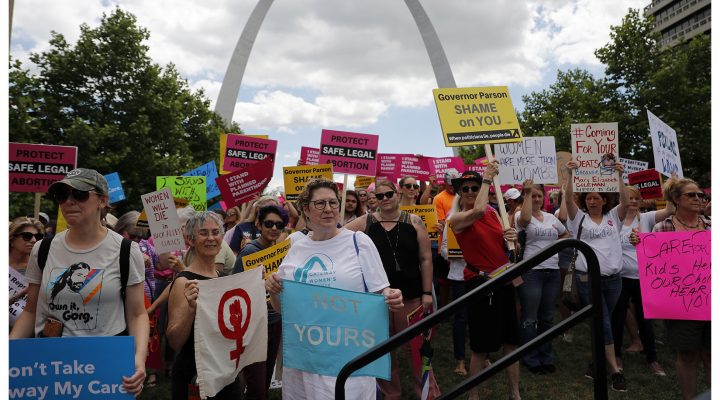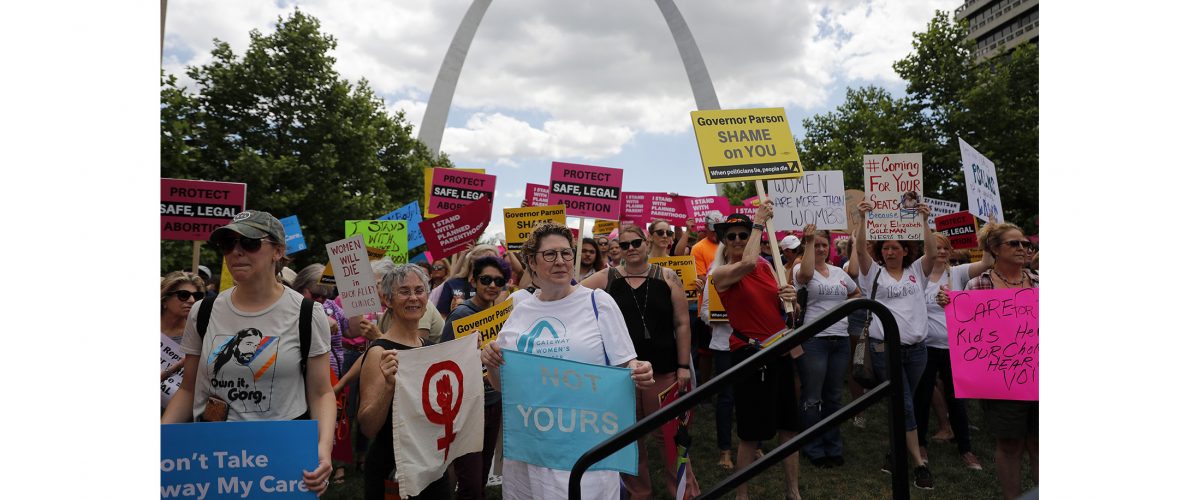An evangelical legal advocacy group wants to stop Missourians from being able to vote whether to enshrine abortion rights into state law.
The Thomas More Society on Aug. 22 filed its legal effort to stop Amendment 3 from appearing on the Missouri ballot this November, an initiative already certified by Missouri Secretary of State John Ashcroft, a Republican.
Filing on behalf of some state lawmakers and other individuals, Thomas More lawyers claim the ballot initiative was “erroneously certified” because it violates the Missouri Constitution and other state statutes.
The “Right to Reproductive Freedom Initiative” seeks to amend the state constitution to:
- Establish a right to make decisions about reproductive health care, including abortion and contraceptives, with any governmental interference of that right presumed invalid.
- Remove Missouri’s ban on abortion.
- Allow regulation of reproductive health care to improve or maintain the health of the patient.
- Require the government not to discriminate, in government programs, funding and other activities, against persons providing or obtaining reproductive health care.
- Allow abortion to be restricted or banned after Fetal Viability except to protect the life or health of the woman.
The measure gained traction when Missouri banned nearly all abortions after the U.S. Supreme Court reversed Roe v. Wade, leaving most abortion legislation to the states.
Thomas More attorneys claim this amendment would create a new “super-right” unlike other rights in state law.

Mary Catherine Martin
“Its main provision creates a totally novel, and limitless, ‘super-right’ ranking higher than life, speech, religion, equal protection and due process,” said Mary Catherine Martin, Thomas More Society senior counsel. “This would require the courts, when making decisions relating to reproduction, to place this ‘super-right’ above the interests of anyone else, and even of society as a whole.”
The group also claims adoption of the amendment would “repeal essentially all of Missouri’s state statutes and constitutional provisions regulating reproductive care and technologies, including all existing regulation of abortion, cloning, IVF for stem cell research, gender transition surgery, and genital mutilation.”
“It is a scorched earth campaign, razing our state lawbooks of critical protections for vulnerable women and children, the innocent unborn, parents and any taxpayer who does not want their money to pay for abortion and other extreme decisions that this Amendment defines as ‘care,’” Martin said.
Rather than merely working to oppose the initiative among voters — which has become a losing proposition in even otherwise conservative states — the Thomas More suit wants to prevent state residents from being given a vote. Their legal tactic is to attack the way the initiative got to the ballot.
“By failing to specify the laws and constitutional provisions that it would repeal, directly or by implication, the initiative petition that led to proposed Amendment 3 violates both the state’s Constitution and its laws,” the conservative group said in a news release.
Martin said: “Under our initiative petition process, Missourians are free to tie their hands in this way, but the Constitution and statutes require that they know that they are doing so.”
The Missouri Independent quoted Rachel Sweet, campaign manager for Missourians for Constitutional Freedom, which is supporting Amendment 3, calling the lawsuit “yet another baseless and desperate attempt from politicians to silence Missouri voters and prevent them from being heard.”
Supporters of the amendment say it would return Missouri to the standard of the 1973 Roe v. Wade decision.
Supporters of the amendment say it would return Missouri to the standard of the 1973 Roe v. Wade decision, which legalized abortion up to the point of fetal viability. Missouri’s amendment also includes exceptions after viability “to protect the life or physical or mental health of the pregnant person.”
The lawsuit seeking to stop the ballot initiative was filed in Cole County Circuit Court. Courts have until Sept. 10 to make changes to the November ballot, Secretary of State’s office spokesperson JoDonn Chaney told the Associated Press.
Thomas More Society is working on behalf of Missouri State Sen. Mary Elizabeth Coleman, pro-life advocate Kathy Forck, State Rep. Hannah Kelly, and Our Lady’s Inn President and CEO Peggy Forrest.
This is one of two current challenges to the November ballot initiative.
An abortion-rights group is suing Ashcroft over how his office is describing the measure in a ballot summary: “A ‘yes’ vote will enshrine the right to abortion at any time of a pregnancy in the Missouri Constitution. Additionally, it will prohibit any regulation of abortion, including regulations designed to protect women undergoing abortions and prohibit any civil or criminal recourse against anyone who performs an abortion and hurts or kills the pregnant women.”
That language is “intentionally argumentative and is likely to create prejudice against the proposed measure,” abortion-rights attorneys wrote in the petition.
Last year, Missouri courts rejected a proposed ballot summary for the amendment that was written by Ashcroft, ruling that his description was politically partisan, according to the AP.
The ballot initiative in Missouri is part of a national campaign to restore abortion rights that vanished in some states after Roe v. Wade was reversed. Similar ballot measures to protect access to abortion will be on the ballot in Arizona, Colorado, Florida, Maryland, Montana, Nevada, New York and South Dakota.
Already, ballot initiatives to secure abortion access have succeeded in seven states: California, Kansas, Kentucky, Michigan, Montana, Ohio and Vermont.
Related articles:
Anti-abortion forces seek to complicate fall vote on constitutional amendment in Florida
Florida high court gives hope to both sides in abortion debate
GOP abortion laws are wildly out of step with many evangelicals’ convictions | Analysis by David Bumgardner


